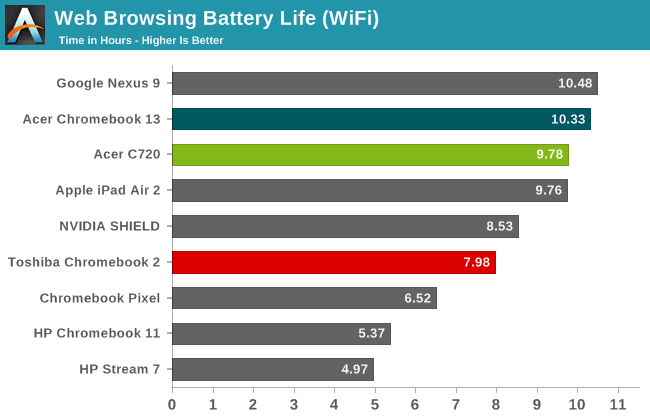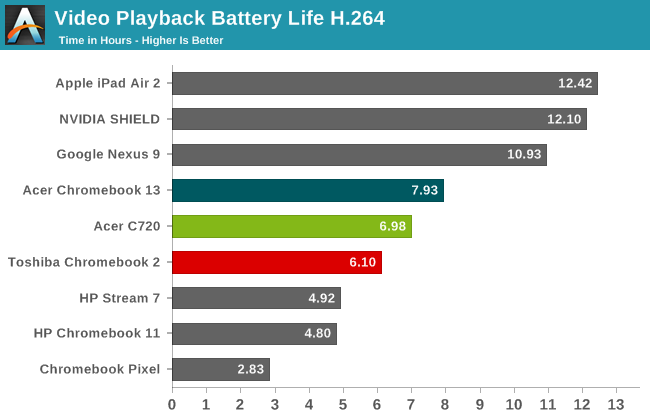Toshiba Chromebook 2: A Feast for the Eyes
by Jarred Walton on February 11, 2015 10:00 AM ESTToshiba Chromebook 2 Battery Life
After looking at performance, I was hoping that battery life might be a saving grace for the Celeron N2840. Unfortunately, the rated battery life of “up to” nine hours is pretty much spot on. The battery capacity is slightly lower than on the Acer C720 and CB13, but there’s just no getting around the fact that they beat the Toshiba CB35 by a decent amount. Here are the charts:


In our Internet battery life test, which is the same as our tablet WiFi battery life test, the Toshiba Chromebook 2 delivers just shy of eight hours of mobility. That would be great in the world of Windows laptops, but competing Chromebooks are now delivering closer to 10 hours of battery life. Video Playback (again, with the same 720p video we use for tablet testing) is likewise quite a bit worse than competing Chromebooks, coming in 0.9 hours short of the C720 result (though that has a smaller 11.6” display) and 1.8 hours less than the Acer CB13.
There’s another way to look at things, which is the amount of power being consumed by the device. With a 44Wh battery, in our Internet test at 200 nits the Toshiba CB2 is only drawing around 5.5W for WiFi and 7.1W for 720p video, but that’s almost a full 1W more than the Acer CB13 and C720 for WiFi and 1.5-2.0W more for video decoding. And then there are the tablets; the Apple iPad Air 2 draws about 2.8W in our WiFi test and the Nexus 9 just 2.4W; for video decoding, tablets (or at least, Android and iOS) fare even better, as they use even less power than in our WiFi testing – 2.3W for the Nexus 9 and 2.2W for the iPad Air 2. Both of course have significantly smaller displays, which helps tremendously, but if you’re just looking for long battery life they’ll win every time.
Battery life still ends up being respectable, however, as there are few times where people need an uninterrupted 8+ hours of battery life with no chance to plug in. If you’re on a long flight it might be nice to get 10+, but otherwise there’s usually some chance to recharge, and whether we’re talking about eight, nine, or ten hours it’s all still “all day battery life” at some level.










66 Comments
View All Comments
nafhan - Wednesday, February 11, 2015 - link
I upload all my photos and videos straight to cloud storage from my phone. I don't bother with this dragging it across to my device thing you speak of. Old school right there...Plus, to discount your final point: there's a number of W8 based devices (mostly x86 tablets) with a similar amount of storage - from the same OEM's.
BackInAction - Wednesday, February 11, 2015 - link
I have the older Toshiba 13 CB at home. I have easily gone 3+ weeks without touching my desktop machine. But I don't do pix, audio or movie editing. I need zero local storage. The only reason I use my desktop is the once-a-month itch I get when I feel like doing a bit of gaming (cheap Steam games).The real crime is that they even make laptops with HDD anymore. That should be the premium upgrade, not the SSD. I would be willing to bet 95% of the PC (windows, MAC and 'linux' desktops) could get by with a 256GB SSD. Which is less than $80. But Apple, Dell, etc. make it a premium option only for stupid expensive PCs.
chlamchowder - Wednesday, February 11, 2015 - link
I wouldn't go so far as to call them pointless - you just need a really, really good internet connection.The intention is this: Jimmy loads the video into his Chromebook, which realizes it doesn't have enough internal storage left. So it uploads directly to the cloud through his dedicated low-latency gigabit connection, and it doesn't feel much slower than using internal storage. The pro is that when Jimmy gets a new Chromebook, he doesn't have to worry about spending hours copying files.
The problem is how hard it is to get a high speed internet connection. It's hard even at home, let alone when traveling (which kind of defeats the portable laptop form factor).
SM123456 - Saturday, February 14, 2015 - link
>>If this were windows it would be laughed out of the page even with 32GB of storage.<<Yes quite right if you were using Windows OS on the device - like for example the HP Stream 11 Windows netbooks which Microsoft has being trying to push as Chromebook killers - these have only 32GB local storage, which reduces to 17.5GB after you deduct the space used by the Windows with no apps installed. These crappy revisited netbooks have apparently flopped very badly.
However this limit does not apply to a Chromebook because, unlike Windows, the ChromeOS image is tiny and doesn't grow in size (in only contains the bare minimum required to run the provided hardware and the web browser, and you can't install programs or drivers on it). ChromeOS also does not use local storage at all except for user downloads and for caching data - all user data, apps etc. are created and stored in the cloud other than for what is temporarily cached locally (eg. local apps, data). Indeed Chromebooks will warn you that data in the local downloads directory may be subject to automatic deletion if space is required (you should use an SD card to store local files you do not want deleted).
Chromebooks just work completely differently to an old OS designed for the low end disconnected desktop era like Windows or an OS designed for high end connected network servers like Unix/Linux. This is how they are able to boot up fast, and run fast and responsively on low end hardware and limited disk/RAM space on which desktop Windows and full Linux installations run very slowly and very painfully.
AdmV0rl0n - Wednesday, February 11, 2015 - link
Lame. The whole industry needs a complete kicking. What we want is a cheap option, and a decent option. So for granny I don't give a crap, I'm happy with the low end, easy care device. What I want is a real laptop that runs chrome AND allows me to do what I want. So give me a Chromebook that has denet spec, and upgradable ram, disk, etc. ts been the heart of the PC industry for two decades, the fact Google and the tech companies can't do this is purely embarrasing.The google guys have added the capability to run linux in the OS. Thats awesome. But not on 16GB of space it's not.
I accept adding ram slots and disk slots adds to price. I accept a faster CPU does as well. *I* accept it has a higher price. Guess what. I have not yet bought a chromebook, and I'm not going to. Not unless this is fixed.
No prime OS and vendor should be happy failing to youtube in 2015. Its pathetic.
Shadowmaster625 - Wednesday, February 11, 2015 - link
Somethign seems to have changed starting with the haswell pentium/celeron U lines. They seem to be all vapor. I cant find one reasonably priced product containing any haswell pentium/celeron 15W chips.savagemike - Wednesday, February 11, 2015 - link
I'm not aware of any Haswell Pentium ever being offered in a ChromeOS device. Haswell Celerons were the standard for a while. Acer C720 and others of its era should still be readily available and at good prices. The screens on most of them aren't great though.Last year Intel really began pushing BayTrail chips in tablets and Chromebooks. Almost all the Chromebooks switched to it. Though I think all the Chromeboxes stayed using Haswell Celerons.
Now Broadwell is about to launch in the Celeron class chip and there is already information that at least some Chromebooks will be using it. Should be on sale in another month or two. I'm hoping Broadwell Celeron is the common chip this year as the Bay Trail stuff was slightly too much of a regeression in my book. The Haswell Celeron is a plucky little chip though and the Broadwell should be all the better.
Pneumothorax - Wednesday, February 11, 2015 - link
Why can't a single PC laptop maker make a laptop with this great screen with a DECENT CPU/iGPU, expandable HDD/SSD, and decent battery life at the $500 price point? Everything else still comes with the same $25 TN panels that should be all automatically thrown in the dumpster.jabber - Wednesday, February 11, 2015 - link
I bet the IPS option costs $25 and the TN $10.zodiacfml - Wednesday, February 11, 2015 - link
Awesome screen. Awesome WiFi. Yet, what to do with those with such an OS?I'd buy in a heartbeat with a big Celeron chip and Windows based for that price.